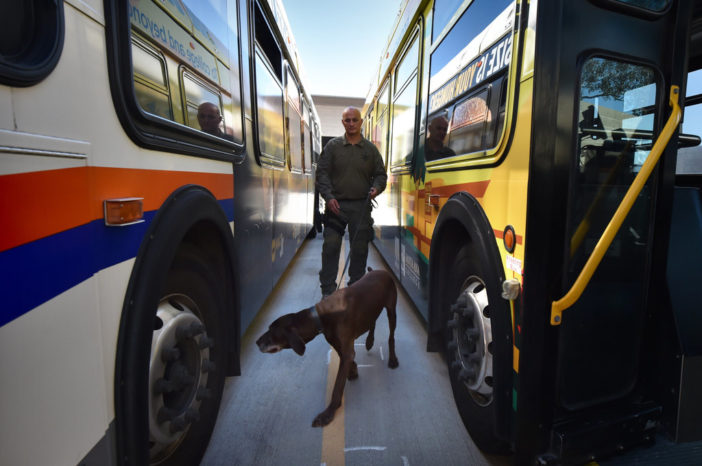German shorthaired pointer Ara excitedly searches the Orange County Transportation Authority bus, looking for her mark. Once she finds it, she sits and waits for her prize: a tennis ball.
Next comes Hulk, a white German wirehaired pointer, aptly named for his size and energy. When he finds his mark, he gets his favorite toy: a Kong on a rope tug.
Kori, the oldest of the three at age 8, is a Vizsla. His maturity shows in his intense, methodical search. But he’s no less enthusiastic at receiving his black Kong toy than the other two dogs.
The March 1 training at the OCTA Santa Ana base is part of a regular weekly training of the Orange County Sheriff’s Department Transportation Security Administration mass transit search dogs.
The unit currently is made up of two teams that work together on a daily basis to accomplish the mission.
One team of three — Deputies Corey Mayer (Kori), Andre Raglin (Hulk) and Mark Borba (Ara) — is assigned to OCTA.
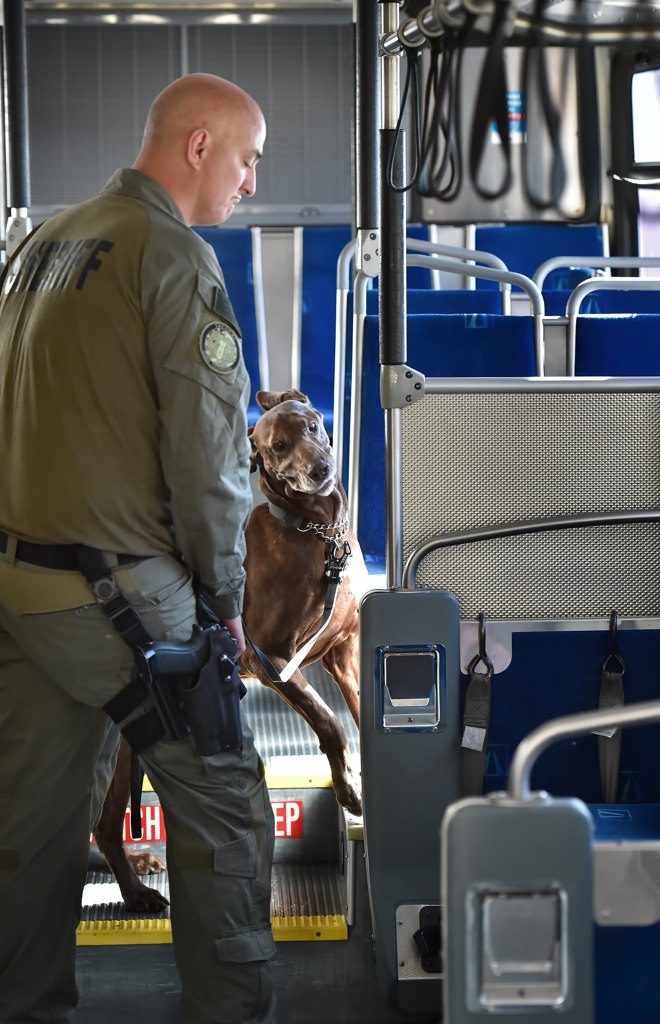
OCSD Deputy Corey Mayer takes his K9 partner, Kori, inside a passenger bus looking for bomb- making material hidden on the bus.
Photo by Steven Georges/Behind the Badge OC
The second team — Deputies JR Ridenour (Rico) and Kyle Stedman (Archie) — is assigned to John Wayne Airport.
Each team also has one additional handler waiting to go to school.
The dogs are federally trained K9s owned by the TSA and taught to sniff out explosives on buses, trains and in airports. The K9s also work alongside the sheriff’s department bomb squad dogs to assist on any bomb threat calls in the county. All of the TSA K9s work with handlers who are bomb techs – meaning they are capable of dismantling a bomb if necessary, saving time and manpower.
Saving time is a big part of the job for these K9s and their handlers.
“We can clear 40 bags, 50 bags in a matter of seconds,” said Sheriff’s Officer Paul Franklin, who has been OCSD’s K9 training assistant for the past six years and runs the training sessions. “No machine can do that.”
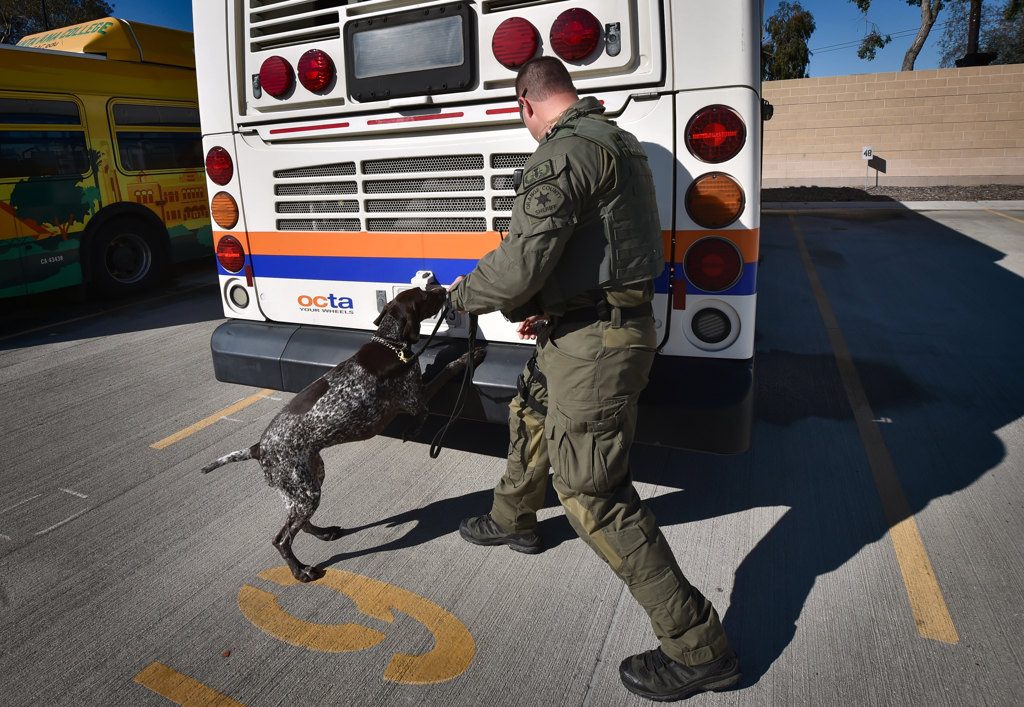
Mark Borba of the OCSD takes Ara, a German shorthaired pointer, around a passenger bus as they search for residue of bomb-making ingredients during a training exercise.
Photo by Steven Georges/Behind the Badge OC
TSA Training
TSA K9 handlers go through a 10-week course at Lackland Air Force Base in San Antonio, Texas, where they start their training with a five-pound bucket on a leash. Handlers are matched with dogs based on their personalities.
“They kind of watch you and evaluate you as a person,” said Borba, who is Ara’s handler. “I don’t get very excited, so my dog is very high energy.”
Handlers go through classwork instruction as well as real-life scenario training in mock facilities, including a full airport terminal and decommissioned airplanes.
“It’s very realistic,” said Borba.
A Typical Day
A typical day for the team will involve proactively searching maybe five different areas –checking buses, trains and terminals throughout the county, said Mayer, who is Kori’s handler.
They spend a lot of time searching unattended luggage, added Borba. They’ll spend over two hours a day in the John Wayne Airport terminal. And if there’s a call – like a recent bomb threat to an Irvine Jewish community center – one or more of the handlers and their dogs may jump in.
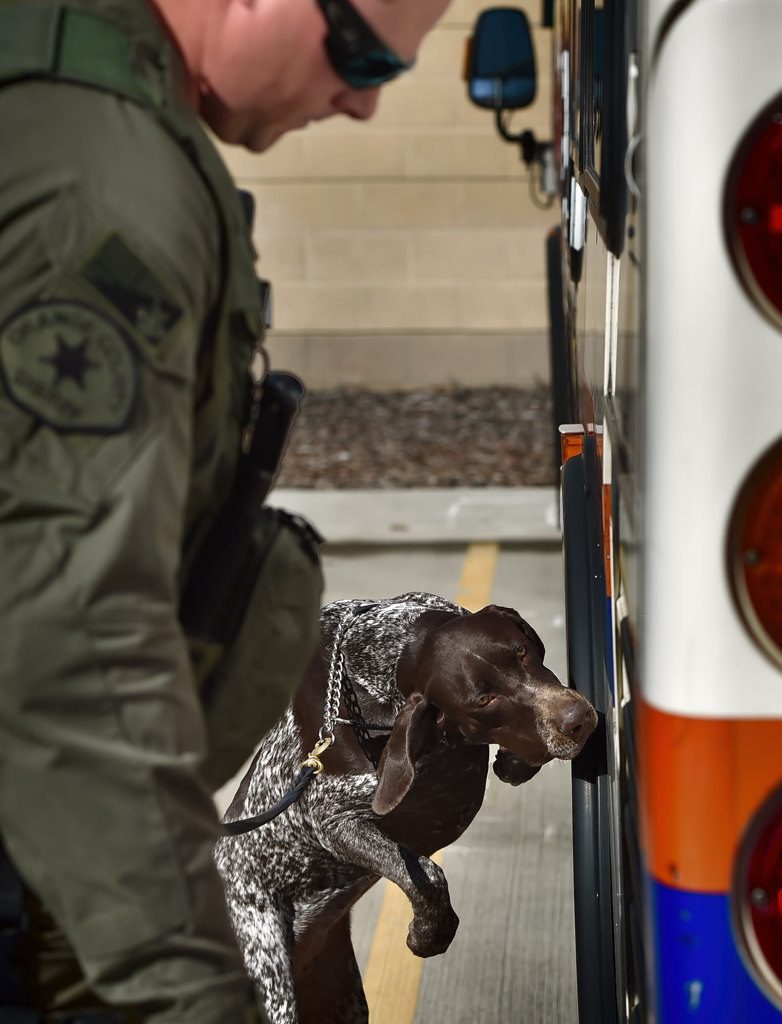
Mark Borba of the OCSD takes Ara, a German shorthaired pointer, around a passenger bus as they search for residue of bomb-making ingredients during a training exercise.
Photo by Steven Georges/Behind the Badge OC
Mayer said the primary function of their team is “to be out, be visible and do random sweeps throughout the county.”
Because they are a federally trained unit, they can perform security searches for county visits by the president of the United States.
“We’re the only ones allowed to do that,” said Franklin.
The team performed all the Donald Trump and Hillary Clinton searches in the county during the campaign season. And because of their federal-level certification, they can also be deployed – voluntarily – to large events like the Super Bowl and the National Presidential Caucus.
“They do use them on a national level,” Franklin said.
Locally they’ve recently worked with the Secret Service for some visiting dignitaries.
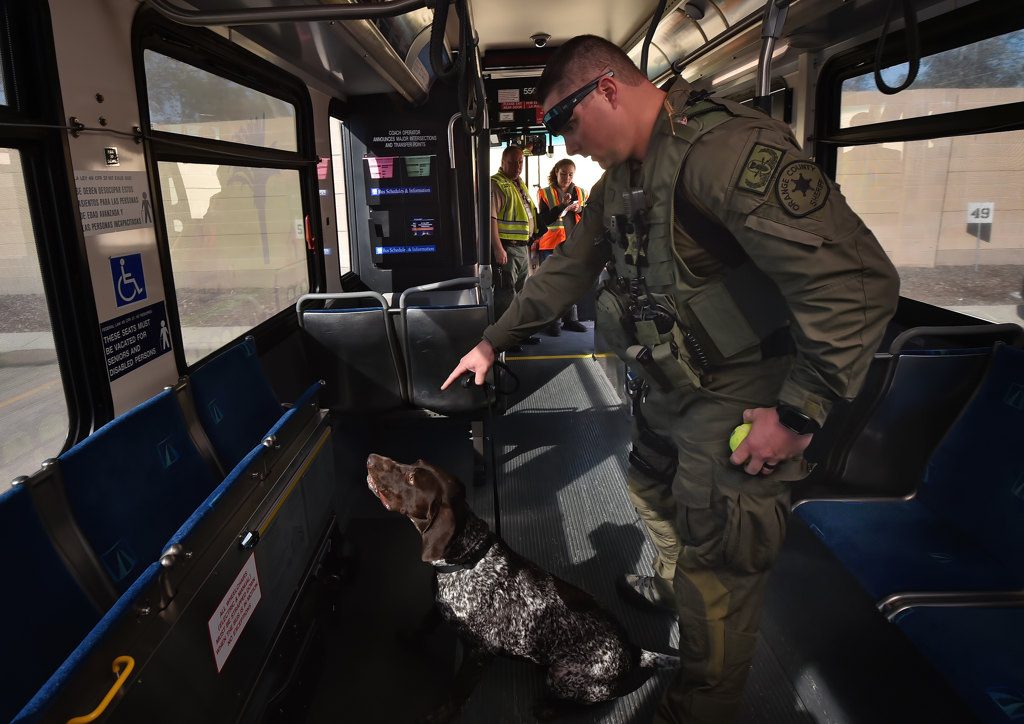
Ara, a bomb sniffing K9 with the Orange County Sheriff’s Department, sits and points for her handler, OCSD Deputy Mark Borba, after finding bomb-making residue inside a passenger bus during a training exercise.
Photo by Steven Georges/Behind the Badge OC
“I did a sweep for Bill Clinton,” said Borba.
The K9s also will work various local events like the Dana Point Festival of Whales.
More Training
Keeping the highly intelligent K9s on their toes is part of the training process. Franklin must change up the location of the target explosive used in training and type of explosive used because the dogs’ excellent scent memory will lead them back to locations where they previously found their targets and received their prize. It is imperative that the dogs are actually finding the scent rather than remembering a previous find.
“If your dog did alert on something, it’s our job as a handler to know if that’s real,” said Borba.
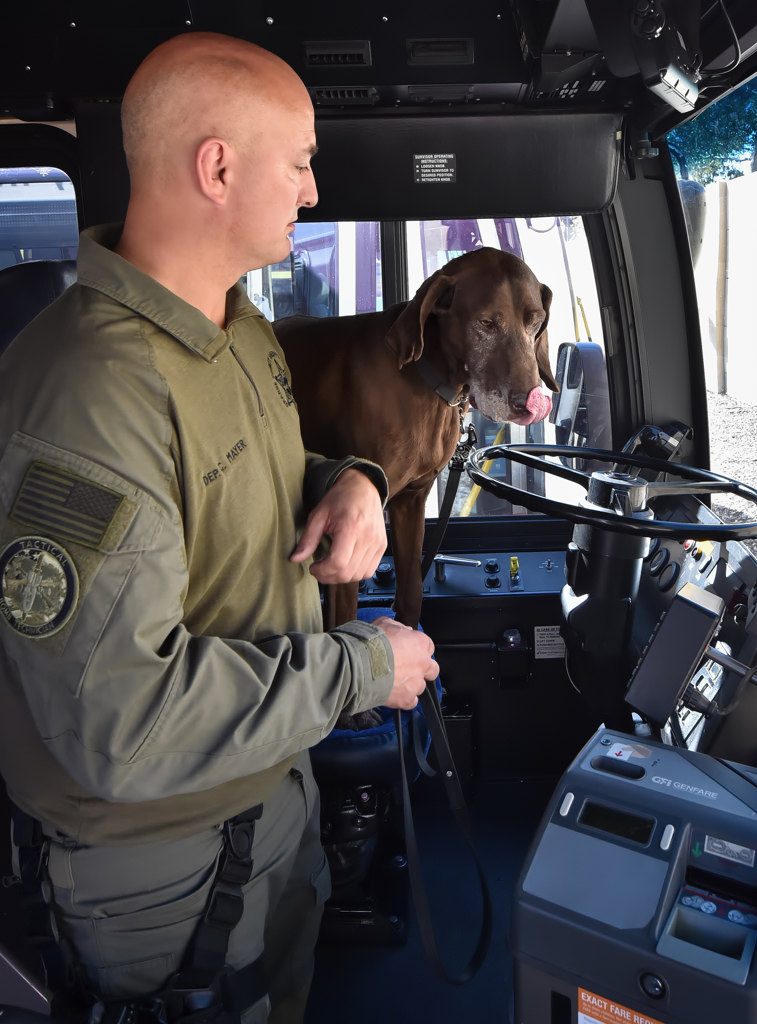
Kori, a Vizsla K9 for the OCSD, sniffs around the driver’s seat of a passenger bus as OCSD Deputy Corey Mayer takes his partner on a training exercise.
Photo by Steven Georges/Behind the Badge OC
As each of the dogs go through the buses looking for explosives, the K9 and handler search the perimeter of the bus before entering and thoroughly searching compartments, both high and low. Some dogs may not be thrilled about searching tight spaces at first, or jumping up onto a seat to search a luggage compartment. These are some areas the weekly training addresses.
“That takes a little time to work on,” said Franklin. “I try to do a lot of problem-solving.”
But it’s well worth it, considering what these dogs are capable of finding. They can detect odor up to 30 to 40 feet, according to Franklin.
“They’re the only tool … that can do this job,” Franklin said. “It always amazes me.”
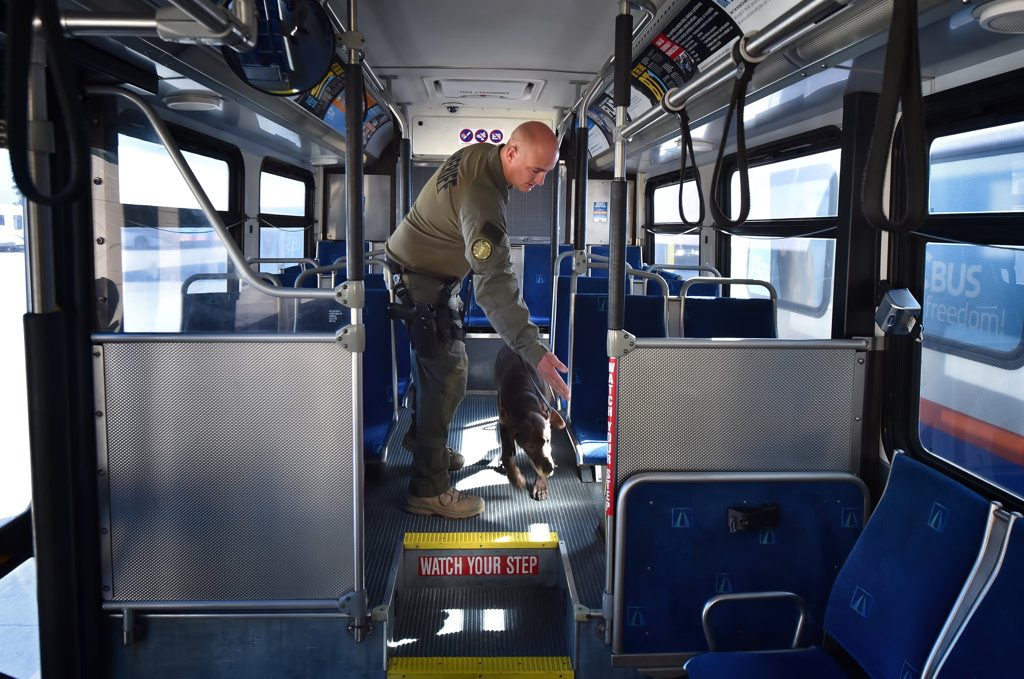
OCSD Deputy Corey Mayer takes his K9 partner Kori inside a passenger bus looking for bomb-making material hidden somewhere on the bus during a training exercise.
Photo by Steven Georges/Behind the Badge OC
Part of keeping the team up-to-date is an annual three-day TSA certification test each handler and K9 must pass by at least 92.5 percent every year or risk being eliminated from the program.
“It’s stressful because you’re really relying on an animal to get you through the test,” said Borba. “It’s your job as a handler to decide: ‘Is my dog really on an odor?’”
The dogs issue what is called a passive alert – a stop/sit – to tell his handler he found an odor. An active alert would involve scratching at the target or barking – but in the case of explosives, this would be too dangerous.
“You don’t want them to (be aggressive) on the explosive,” said Borba. “You don’t want them touching it.”
In fact, Borba said, if a package or situation seems too dangerous – like a recent call of a plain, cardboard box duct-taped together – a K9 would not be sent in. The package would be handled like a bomb squad call and be X-rayed.
“We don’t run our dogs if it’s really sketchy,” he said.
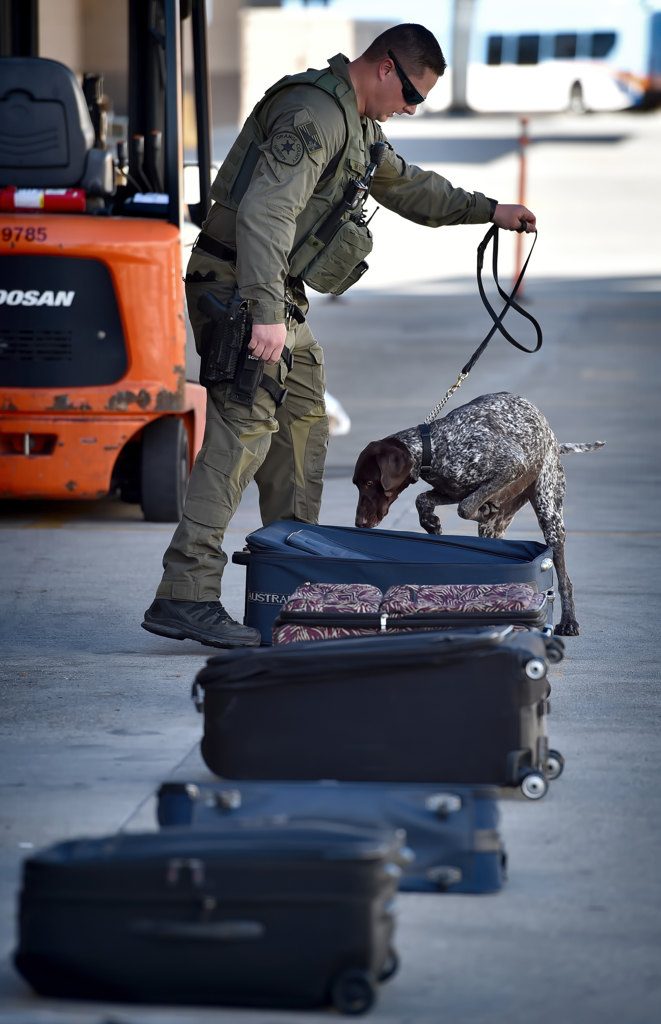
OCSD Deputy Mark Borba takes his K9 partner Ara through a series of luggage looking for the one that has bomb-making residue hidden inside.
Photo by Steven Georges/Behind the Badge OC
In addition to the buses, the March 1 training also involved searching 12 pieces of actual luggage filled with clothing, all donated by Goodwill. The training is designed to simulate a real-life luggage search. The luggage is lined up in a row and each dog passes through in a pattern, sniffing for the explosive. Each dog quickly finds his or her mark.
“Kori’s just an old pro at it,” Franklin said of the dog after he carefully weaved in and out between the pieces of luggage and sat in front of his mark.
The team makes sure to praise Kori with a “good boy” as he plays with his prized toy.
“It’s the best job there is on the department as far as I’m concerned,” said Mayer.
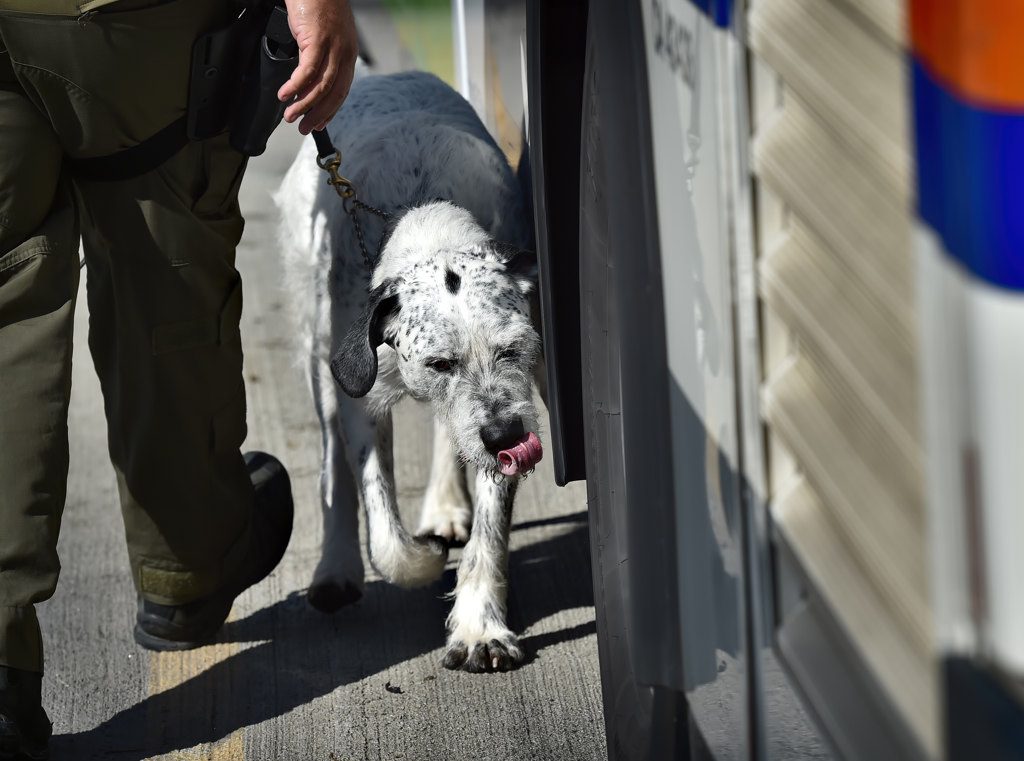
Hulk, a German wirehaired pointer K9 for the Orange County Sheriff’s Department, sniffs around looking for bomb-making material hidden somewhere on a passenger bus during a training exercise.
Photo by Steven Georges/Behind the Badge OC
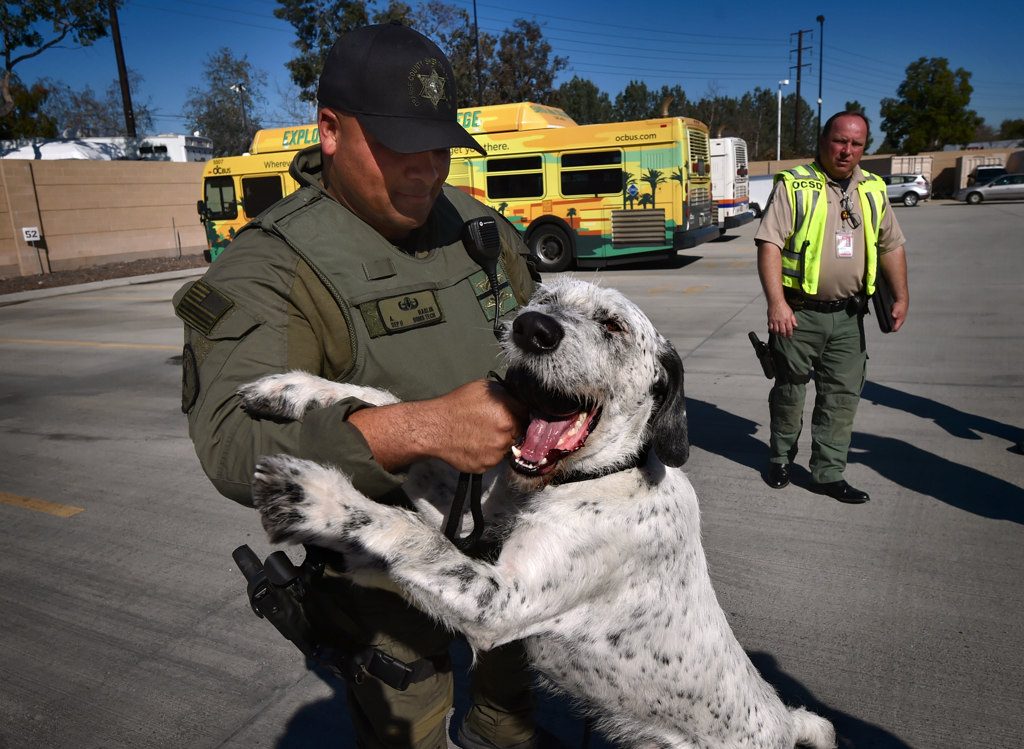
Hulk gets his reward from OCSD Deputy Andre Raglin after he found the hidden bomb-making material during a training exercise.
Photo by Steven Georges/Behind the Badge OC
 Behind the Badge
Behind the Badge
